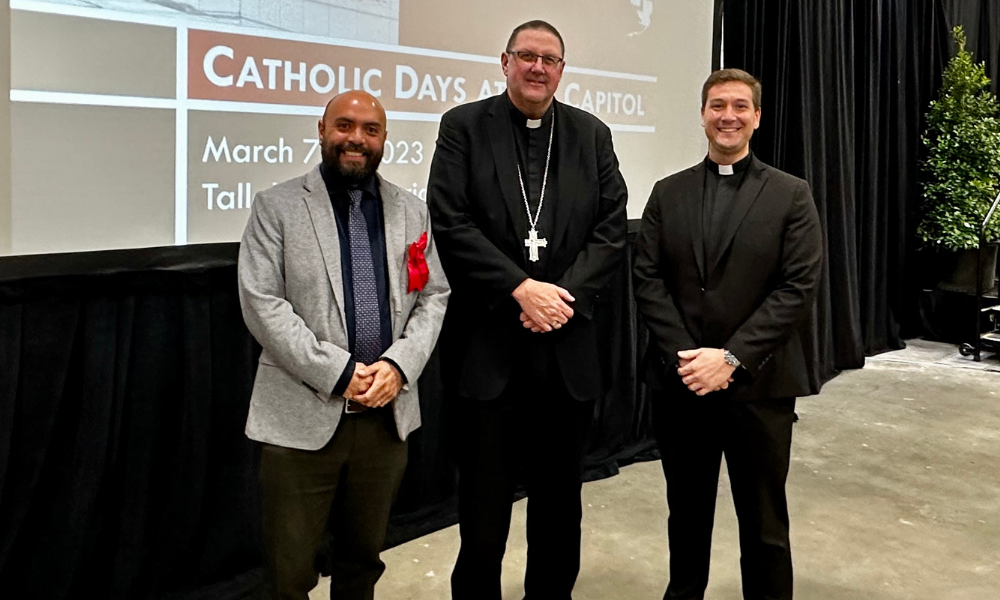
Catholics Travel to Tallahassee to Advocate for Just Causes
March 14, 2023 | Every year during the legislative session, dioceses in Florida send a delegation to Tallahassee, our state’s capitol.
March 14, 2023 | Every year during the legislative session, dioceses in Florida send a delegation to Tallahassee, our state’s capitol.
The purpose is to advocate for a variety of issues to help build a just society. The initiative is known as Catholic Days at the Capitol. This year the Diocese of St. Petersburg sent a delegation of 26 people led by Bishop Gregory Parkes. Although there are many social issues that are important to Catholics, three areas of focus for this year were on abortion, educational choice for families of school-aged children and the requirement of having a unanimous jury for capital punishment, also known as the death penalty. (Click here to read about other public policy priorities for this year.)
The first bill discussed was HB 7/ SB 300, which seeks to increase protection of women and unborn children by shrinking the window of time in which an abortion may legally be obtained. Provisions of the bill prohibit abortion after six weeks gestation – at the time a heartbeat can be detected. Our faith teaches and biology confirms that life begins at conception, thus we look forward to the day when all abortions are illegal and unthinkable. While this bill does not end abortion in Florida, it limits its harm and is a significant improvement over current law that allows abortion up to 15-weeks gestation. When it is not possible to end abortion, “proposals aimed at limiting the harm done” are legitimate and proper (St. John Paul II, Evangelium Vitae, no. 73).
The second bill, HB 1/ SB 202, is a request to expand access to state scholarships for all students and to convert state scholarships into educational accounts. Every student in a public school in the state of Florida is allotted a certain amount of money for education. Current provisions to allow families to use some of those funds as scholarships for their school of choice, even private Christian schools, have been a very positive step forward, but an expansion of access would be even more beneficial. The funds are not meant for the support of any school, but rather the families who are the primary educators of their children.
The third bill listed as HB 555/ SB 450 would eliminate the unanimous jury requirement for imposing a death sentence. Currently, most states that maintain the death penalty require a unanimous jury to sentence someone to death. There is interest among some officials to make it easier for the state of Florida to sentence an individual to death, without the need for unanimous jury. However, if our state is going to continue to resort to the death penalty, it should be applied as fairly and reliably as possible by engaging every juror in the process. This is a sensitive subject. Accommodation was once made for the death penalty, as it was the very last resort to help protect society. Now with the progress in security in prisons, it is not necessary. In 2018, Pope Francis asked for a revision to the Catechism of the Catholic Church, which articulates that the dignity of the human person is not lost even in the commission of very serious crimes and, with today’s effective systems of detention, the death penalty is considered inadmissible. (CCC 2267). This is in line with other recent pontiffs including Pope Saint John Paul II who appealed for an end to the death penalty calling it cruel and unnecessary.
The Church’s primary mission is to share the love of Christ to all, primarily through the Good News of salvation, but this also means that we can impact the temporal order. Support of these actions are one way of bringing about a just society, but other ways can help contribute to that same mission. Prayer for example should not be under-estimated. Please consider praying for the advancement of these just causes.
Dr. Armando Chavarria is the Executive Director of MIssionary Discipleship for the Diocese of St. Petersburg.
